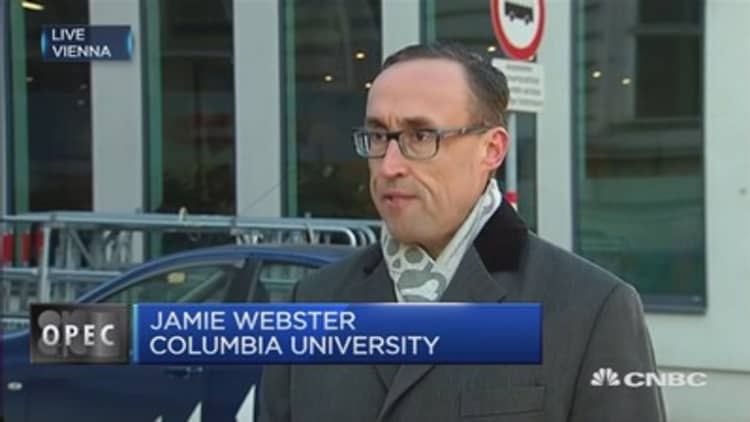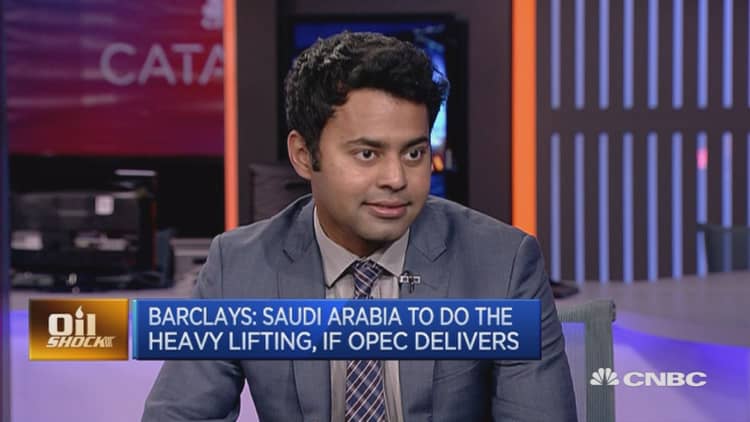
Skepticism is mounting that OPEC will succeed in hammering out a deal on Wednesday to cut oil production thanks to a recent flurry of statements and communications that hint at the waning enthusiasm among some key members of the oil-producing cartel.
Jamie Webster, a fellow at the Columbia Centre for Global Energy Policy told CNBC that Wednesday's meeting in Vienna is "kind of our last chance" for OPEC to act. Yet while he says conditions are mostly in place to support an agreement – such as a slowdown in U.S. shale production, a return of demand and Iran and Iraq giving signs of reaching current capacity limits - his optimism is contained.
According to Webster, "A lot of the pieces are there, it's just a question of whether they can all come together."
"Right now it's not looking that great," he added.
His hesitation is shared by Bjarne Schieldrop, chief commodities analyst at Nordic bank SEB, who told CNBC via email that he saw a very low chance of a cut being agreed on Wednesday.
Developments in recent days include the Russian news agency RIA reporting on Tuesday that the country's energy minister, Alexander Novak, has said he would not travel to Vienna for the OPEC meeting on Wednesday but would consider collaboration with the cartel afterwards if they managed to deliver a proposal.
Iran and Indonesia were among the countries reported by Reuters on Tuesday morning to also be wavering on giving a commitment.
Meantime, Reuters cited a source avowing that, following Monday's meeting of OPEC experts, no "concrete details" had been agreed regarding levels of production cuts to be proposed on an individual country basis.
However, Barclays' oil market analyst, Miswin Mahesh, told CNBC on Tuesday that Saudi Arabia's market-spooking comments over the weekend that no production cuts were needed were just "classic game theory".
According to Mahesh, "You're telling your opponents that even if there isn't a deal we're not going to be as hurt as originally stated. It's all about the negotiation tactics at this stage – every country is doing it."
Yet ultimately, Mahesh posits, all of the countries – including those such as Iran that have been very vocally downplaying their need for a deal of late – know the high consequences of not getting a deal done.

Although exact figures are difficult to discern, OPEC's dwindling dominance is reflected in its share of global production dropping from 54 percent in 1973, according to the Middle East Research and Information Project, to 42 percent today, according to Statista. Of today's top five global producers, only Saudi Arabia and Iraq are part of the cartel.
Webster says this dynamic signals an important change for the industry.
"This is no longer a unipolar market, this is a multi-polar market. It matters what OPEC does, it matters what the U.S. does, Russia, China. These all matter much more than in the past," he explained.
Emphasizing the greater extent of coordination needed in today's world, he added, "It isn't just one meeting that you can go to figure out what's going to happen on the supply side."
Late Tuesday morning oil was trading just shy of 2 percent lower for the session, at around $47 per barrel.
A note from Barclays on Tuesday cited the potential for price fluctuations depending on Wednesday's outcome, saying, "says "If no (OPEC) deal is implemented, further downward pressure is likely. If a deal is secured then oil prices could well move above $50 per barrel relatively quickly."
However, referring to an improvement in market dynamics since meetings were held in the Qatari capital last April, Mahesh says that while the oil price will certainly fall in the case of no deal, "a very, very sharp fall in the very immediate term might be ruled out just because the fundamentals aren't as weak as they were at Doha."


